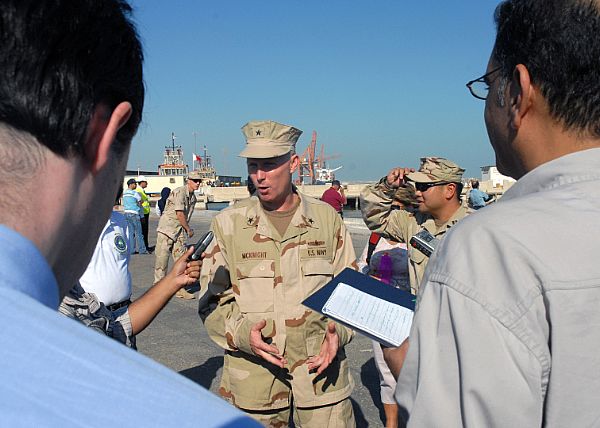The fact is, an international naval force is assembling "to battle pirates off the coast of Somalia." (AP) By the time its mission starts, later this month, more than 20 nations will probably be involved.
The international force must be "unilateral" though. An American is commanding it: U.S. Navy Rear Admiral Terence McKnight.

(U.S. Navy photo by Anderson Bomjardim, used without permission)
Task Force 59's commander, Rear Admiral Terence E. Mcknight, fielding questions at a coalition forces' crisis response exercise. (November 6, 2007)
"Unliateral," "Quagmire," and Living in the Sixties
To be fair, I don't think we'll be hearing all that much about "unilateral" American action against Somali pirates.- Terms like "unilateral" and "going it alone" fell out of fashion rather early in the presidential election: Partly, I think, because people found out how many countries had "unilaterally" invaded Iraq.
- Since it is an international force, credit for success can be doled out to
- Participating nations
- This may already be happening
- The Obama administration
- Thereby vindicating hopes that Barack Obama will restore America's standing in world opinion
- Participating nations
I'm not cynical: but I have been following the news for decades, and think I've spotted a few journalistic habits.
Woodstock's Over, Disco Died, It's Time to Wake Up
I'm probably preaching to the choir, but: It isn't the sixties any more. It's time to tune in, and drop back in. Quite a bit has happened in the last forty years.For one thing, the Vietnam war ended: badly, but it ended. From the way "quagmire" kept being used to describe wars fought in deserts, I get the impression that many Americans didn't get the memo.
Word seems to be getting around, though. I recently found "quicksand" used to describe America's 'failure' in the Middle East.
There was, and is, an almost nostalgic quality to many reports from Iraq. A few years ago, headlines like "Iraq's My Lai!" and "Defining atrocity of the Iraq War!" heralded an incident at Haditha, Iraq. People like me, who aren't working for the traditional information gatekeepers, found out what actually happened. The fanfare of "Iraq's My Lai!" faded, like echoes of a trumpet in the hills.
I don't expect people to give up memories of their youth, but I do think that it's a good idea to keep up with the times.
Today, outfits like the Taliban and Al Qaeda have a rather definite idea about how the world should be run. The 9/11 attack that took out New York City's World Trade Center was part of their efforts to make the world safe for their version of Islam.
This is a real threat to America, and practically everybody else. Their approach to people who protest against them, or are counter-cultural (like men who wear trousers), makes Kent State look like a tea party.
Pirates and the War on Terror
The Somali pirates are not Islamic terrorists. In fact, real terrorists, based in south Sudan, attacked the northern-Sudan pirates after a Saudi ship was captured. Apparently, it's okay to pillage non-Muslims, but 'Islamic' interests should be left alone.The way I see it, dealing with Somali pirates and the War on Terror are closely related, because both stem from cluelessly idealistic efforts to 'help' European colonial holdings become nations (like the Versailles Treaty).
America, at least, seems to have learned something about dealing with people who aren't European. The invasion of Iraq and this international force to deal with piracy are two examples of an approach that seems to work:
- Treat local leaders with respect
- If they want to communicate with bullets, oblige them
- Find out which nations are willing to help deal with a situation
- Get them organized - odds are, this will mean leading them
- Let nations whose leaders don't want to help know what you're doing
- But don't wait for their permission
More-or-less related posts:
- "Goodbye Quagmire, Hello Quicksand: Champions of Relevance Catch Up"
(January 5, 2009) - "Guinea, Military Rule, and Terrorism: Beware Hasty Judgment"
(December 29, 2008) - "Chinese Navy to Somali Waters - Time Running out for Somalia?"
(December 18, 2008) - "Recruiting for Terror? Somali Minnesotans Missing, One Found Dead"
(December 4, 2008) - "Cruise Ships and Safety: Designated Smoking Areas and Sonic Cannons"
(December 1, 2008) - "Negotiated End to Somali Piracy - This Just Might Work"
(November 26, 2008) - "Baghdad's Palestine Hotel Open for Business: Nothing to See Here, Move Along?"
(November 16, 2008) - "The New York Times, Insularity, and Assumptions"
(October 21, 2008) - "Watch for Weird Words: Election's Coming Up!"
(August 9, 2007)
- "US to head anti-pirate patrols off Somalia"
The Associated Press (January 8, 2009) - "French ship released as China begins anti-pirate patrols"
CNN (January 7, 2009) - "A Barack Obama Presidency Will Restore America's Prestige"
American Chronicle (June 6, 2008)
- "McKnight Relieves Hall as Commander Expeditionary Strike Group 2"
United States Navy (September 30, 2007) - "Rear Admiral Terence E. "Terry" McKnight
Expeditionary Strike Group 2/Commander, Task Force 51/59"
United States Navy Biography (last updated September 25, 2007)
Related posts on piracy and the War on Terror.

No comments:
Post a Comment